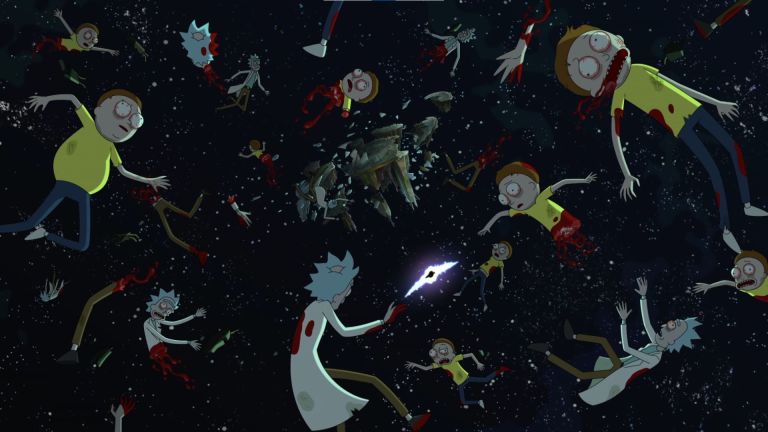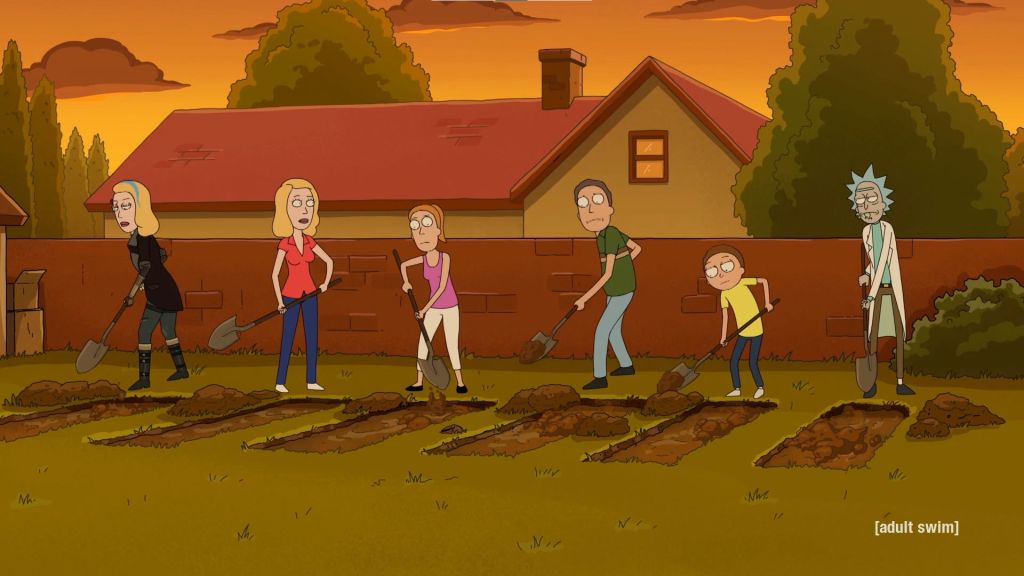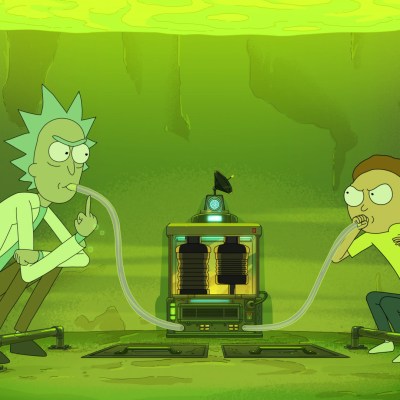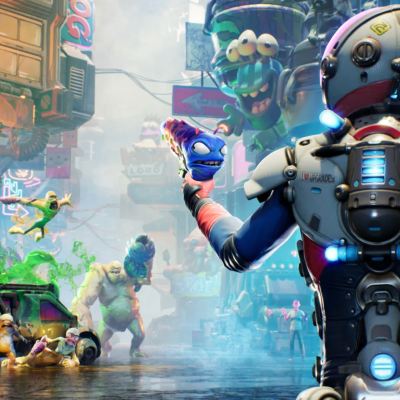Is Rick and Morty Ready to Embrace Its Lore?
In the Rick and Morty season 6 premiere, the sci-fi comedy appears ready to finally embrace its own canon.

This article contains spoilers for RICK AND MORTY season 6 episode 1.
Dan Harmon and Justin Roiland’s hit animated sci-fi sitcom Rick and Morty has struggled with a bit of an identity crisis from the outset. Is it a show about the importance of family or a nihilistic treatise on how nothing matters? Is it a sci-fi epic full of canonical lore that carries over from season to season or a collection of silly, self-contained sci-fi rigamarole adventures?
With its brilliant first season, it somehow managed to be both of those things, which is what gave the show a unique identity and made it such an exciting new series. The premise of an asshole all-powerful scientist dragging his naïve, subservient grandson along with him on various sci-fi quests at first blush seemed like—and was almost certainly originally conceived as—a vehicle for ever more insane and hilarious high-concept spectacles. When one of your protagonists can do just about anything, you can, only three episodes in, do stuff like introduce an entire universe of super-smart dogs and orchestrate a plot that culminates with the corpse of a giant, naked, dead, homeless man exploding over the United States.
However, in the fourth episode, “Meeseeks and Destroy,” things took a surprising turn when the sci-fi outer space hijinks were brought crashing down to earth, courtesy of a scene in which Morty fights off an attempted sexual assault. Despite the fact the perpetrator is a guy named Mr. Jellybean who looks like his name sounds, the scene and Morty’s reaction to it was not played for laughs, and was instead presented darkly and earnestly. But if this episode was the first hint that Rick and Morty was going to be more than a collection of kooky one-off adventures, the following one tore the show’s universe wide open.
In “Rick Potion #9,” Rick accidentally “Cronenbergs” the world—a sci-fi screw-up so irreversible that he and Morty flee their reality to take the place of a deceased Rick and Morty in a near-identical alternate reality. All at once, the episode introduces the concept of a multiverse of infinite realities, introduces the idea that Rick can take up residence in any of these on a whim (and has done so before), and transforms Morty from naïve and subservient to jaded and pissed off. It’s a seminal moment for Rick and Morty, forever redefining what the series was and what we could expect from it.
The events of “Rick Potion #9” hang over and ripple throughout the entire series. There’s the obvious effect of introducing Rick’s ability to portal his way from universe to universe, as well as Morty’s more cynical characterization. But the series continues to directly recall the episode in more literal ways too, more than once referencing the fact that the Rick and Morty buried their other selves in the backyard or showing us how the Cronenberged Dimension they left behind is still post-apocalyptically trudging onward.
Season six’s premiere, “Solaricks,” revisits what went down in “Rick Potion #9” in the most literal way yet when Rick accidentally resets all portal travelers to their places of origin, sending Morty back to the universe he and his grandpa ditched after they Cronenberged everything up. Further, the episode ends with another blunt callback as Rick, Morty, and the rest of the Smith family bury versions of themselves in the backyard of yet another new universe.

“Solaricks” is something of a companion piece to “Rick Potion #9.” The latter episode marked a point of no return where so many dark truths about the multiverse were revealed to us (and to Morty) that echoes of it would be felt throughout the series forever afterward. It only took close to nine years, but “Solaricks” is finally reckoning with what “Rick Potion #9” set up by reaffirming that all this fucked up stuff happened and that it matters to these characters and their world(s).
This is a big deal because, while Rick and Morty has always contained threads of continuity, it’s more flirted with it when it was convenient, with a winking reference to the Cronenbergs, a visit to the Citadel of Ricks, or the occasional reappearance of Evil Morty. More often, it’s aggressively resisted it in favor of goofy, one-off adventures with no lasting impact. The series has no problem decimating the fourth wall at every turn, so there’s even been a fair bit of overt mockery when the idea of canonical lore has come up, as in “Never Ricking Morty,” which jokingly posits and quickly discards possible future scenes and finales for Rick and Morty, chucking in fan-favorite characters like Mr. Meeseeks and Evil Morty, suggesting at once an awareness of and distaste for the serialized elements many fans have craved. Rick himself has made clear how he despises backstory and lore, dismissing the Citadel of Ricks as a place that “runs on canon” and, in season three’s premiere, tricking a Galactic Federation agent into believing Rick’s origin story is one of those cliched, murdered-family, vengeance-seeking ordeals as first popularized by Charles Bronson.
The avoidance of lore and consequence came to a head with season five, a season which did its damnedest to dodge anything that might be too sincere, sidestepping character and world development in favor of absurdist spectacle. We got a Hellraiser parody, a Thanksgiving episode about turkey super-soldiers, a Voltron parody, and—lest we forget—giant, talking sperm. It was all very stupid and not particularly funny either, making for the worst season yet.
But then, the final three episodes bucked the season five trend of dumb, one-off nonsense by delving deep into Rick’s friendship with Bird Person, bringing back Evil Morty, canonizing the origin of Rick’s character motivation, and stranding the titular duo in space with no portal fluid. We’ve been teed up with cliffhanger season finales only for them to be resolved in half-a-season-premiere, so it was quite the shock when “Solaricks” confirmed that all this stuff is still true: Evil Morty has been (temporarily) written out, we have a new Big Bad in Rick Prime (alternatively known as Weird Rick), there really is no portal fluid, and Rick actually is motivated by vengeance for the death of his original wife and daughter.
That last revelation seems especially bizarre. There was a time at which the creators believed that revealing too much about Rick, giving him a tragic backstory, would be a disservice to the character, that it would ruin him a bit. The misdirect in the season three premiere openly mocked how cheesy it would be to go with the dead wife vengeance origin story. So why canonize it now?
The answer is: it’s all my fault. Well, okay, it wasn’t just me, but it was fans like me. To quote Dan Harmon: “We knew that if we just hit the reset button at the top, that would be considered lazy or unsatisfying…Let’s just do this for everybody that’s been waiting.”
So, yes, it’s because of people like me who have been asking for some character consistency, pointing out that Morty keeps relearning that the multiverse is a dark, hopeless place. Or suggesting that the more all-powerful we learn Rick is, the more it’s a problem that he has no motivation for any of the stuff he does or any worthwhile antagonist to come into conflict with. Fans like me were disappointed in the throwaway, gross-out tomfoolery of season five. “Give us something with consequence!” we cried.
Well, finally, we’ve got what we wanted. Rick has a formidable, looming adversary in Rick Prime. He’s got motivation with his desire for vengeance for his dead wife and child. Beth and Space Beth are both around now so it seems like there will be plenty of meaningful family drama. And there are no portals, so the stakes have been raised in a palpable way.
It’s just too bad it’s kind of a slog so far. Hopefully now that all this complicated exposition has been done away with, things can take on a slightly brisker pace because, though I got a few chuckles out of “Solaricks,” I mostly just sat pensively, clinging onto the storyline for dear life, as all this complex sci-fi hootenanny threatened to escape my understanding of just what the hell was going on. I felt pretty similarly about the season five finale that preceded it. These recent episodes have felt like a lot of info-dumping and not a lot of jokes. Even Dan Harmon admits this shit is complicated, saying they had “lots of confusing conversations” in the writer’s room and admitting “it’s a committee thing keeping track of this stuff. I wouldn’t trust one person to do it.”
It’s not lost on me how annoying it is that I’ve been asking for deeper, more sincere Rick and Morty stories since season two and, now that I’m getting them, my response is “not like that.” So, let me state clearly that I admire the Rick and Morty team attempting this. It’s great that the series is embracing its darkness and trying to take itself more seriously. I love that they’ve driven home that, though there’s infinite families available in infinite realities, it’s this version of the Smiths that Rick chose that has become his family, so they’re important to him. It’s also awesome that Rick is slightly less than all-powerful now and that he has a reason to do the things he does.
In fact, I believe something like this had to happen. If the series had been all surface-level sci-fi silliness throughout, it’d be one thing, but they’ve always dabbled in going deep, in sincerity, and in darkness. Try though they did to distract with giant sperms and Garbage Goobers, Rick and Morty could never escape the canonical fallout of “Rick Potion #9.” If they never tackled it head on, it’d be retreads of middling season five comedy until the end. (Note: I’ve perhaps just implied I don’t like Garbage Goober, which is not the case. I love Garbage Goober).
It’s been a long time coming but Rick and Morty had to get here. Maybe it feels a bit exhausting and over-complicated because the series resisted being this way for so long. We now have other shows created by Rick and Morty alumni, Solar Opposites and Lower Decks, that came out of the gate with more solid, confident understandings of how silly, how dramatic, and how canonical they wanted to be, and so far their output has been a lot more consistent and a lot less messy.
Rick and Morty has at times been just a gag-filled sitcom, at other times a dark, lore-heavy, sci-fi epic, and has had a lot of ups and downs because of it. If nothing else, like co-creator Dan Harmon’s Community before it, Rick and Morty has become a series in which the meta-narrative about the construction of the show behind the scenes has become as interesting as the stories told by the show itself.

